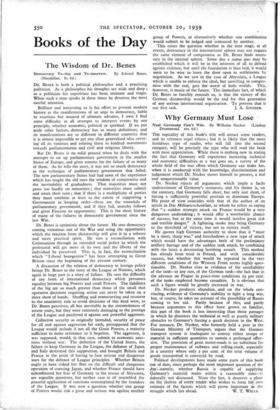Books of the Day
The Wisdom of Dr. Benes
Da. BENES is both a political philosopher and a practising politician. As a philosopher his thoughts are wide and deep ;
as a politician his experience has been intimate and tragic. When such a man speaks in these times he deserves the most careful attention.
Brilliant and interesting as is his effort to present modern history as the manifestations of an urge to democracy, liable to reactions but assured of ultimate advance, I own I find some difficulty in all attempts to interpret events by one principle, whether economic, political or spiritual. If we put aside other factors, democracy has so many definitions, and its manifestations are so different in different countries that it is almost impossible to get any clear generalised idea cover- ini all its varieties and relating them to kindred movements towards parliamentarian and civil and religious liberty.
But Dr. Benes is on solid ground when he deals with the attempts to set up parliamentary government in the smaller States of Europe, and gives reasons for the failure of so many of them. As he tells the story, it was not so much democracy as the technique of parliamentary government that failed. The new parliamentary States had had none of the experience which has taught the old ones the wisdom of compromise and the inevitability of gradualness. That majorities must not press too hardly on minorities ; that minorities must submit and await their turn ; that if there is a multiplicity of parties they must combine at least to the extent of supporting a Government in keeping order—these are the essentials of parliamentary government, and if they fail, anarchy follows and gives Fascism its opportunity. This is the short history of many of the failures in democratic government since the last War.
Dr. Benes is optimistic about the future. He sees democracy coming victorious out of the War and using the opportunity which the reaction from dictatorship will give it in a soberer and more practical spirit. He sees a reconciliation with Communism through an extended social policy in which the proletariat will get more of its own and the liberty of the individual be preserved. This is, in fact, the reconciliation which "Liberal bourgeoisie" has been attempting in Great Britain since the beginning of the present century.
A discussion of the relation of democracy to fox eign policy brings Dr. Benes to the story of the League of Nations, which again in large part is a story of failure. He sees the difficulty of any form of international democracy which presumes equality between big Powers and small Powers. The liabilities of the big are so much greater than those of the small that operative decisions requiring action can never be taken on a mere show of hands. Shuffling and manoeuvring and recourse to the unanimity rule to avoid decisions of this kind were, as Dr. Benes perceives, all but inevitable in the circumstances of recent years, but they were extremely damaging to the prestige of the League and paralysed it against any powerful aggressor.
Collective security as originally intended, security of peace for all and against aggression for each, presupposed that the League would include if not all the Great Powers, a majority sufficient to make resistance to it hopeless. The aggressor, it was supposed, would, in that case, submit to economic sanc- tions without war. The defection of the United States, the failure to keep Germany in the League, the defiance of Japan and Italy destroyed this supposition, and brought Britain and France to the point of having to face serious and dangerous wars for the defence of League principles. Whether Britain ought to have risked her fleet on the difficult and dangerous• operation of coercing Japan, and whether France should have subordinated her fear of Germany to the rescue of Abyssinia, are arguable questions, but neither case at all resembled the peaceful application of sanctions contemplated by the founders of the League. It was now a question whether one group of Powers would risk a great and serious war against another
group of Powers, or alternatively whether one combination would submit to be judged and sentenced by another.
This raises the question whether in the next stage, at all events, democracy in the international sphere may not require the same element of compromise as Dr. Benes finds neces- sary in the internal sphere. Some day a natus quo may be established which it will be in the interests of all to defend against violence, but until the foundation is thus laid, it would seem to be wise to leave the door open to settlements by negotiation. As we saw in the case of Abyssinia, a League which is unable to enforce the ideal, but unwilling to compro- mise with the real, gets the worst of both worlds. This, however, is music of the future. The immediate fact, of which Dr. Benes so forcibly reminds us, is that the victory of the German dictatorship would be the end for this generation of any serious international organisation. To prevent that is












































 Previous page
Previous page